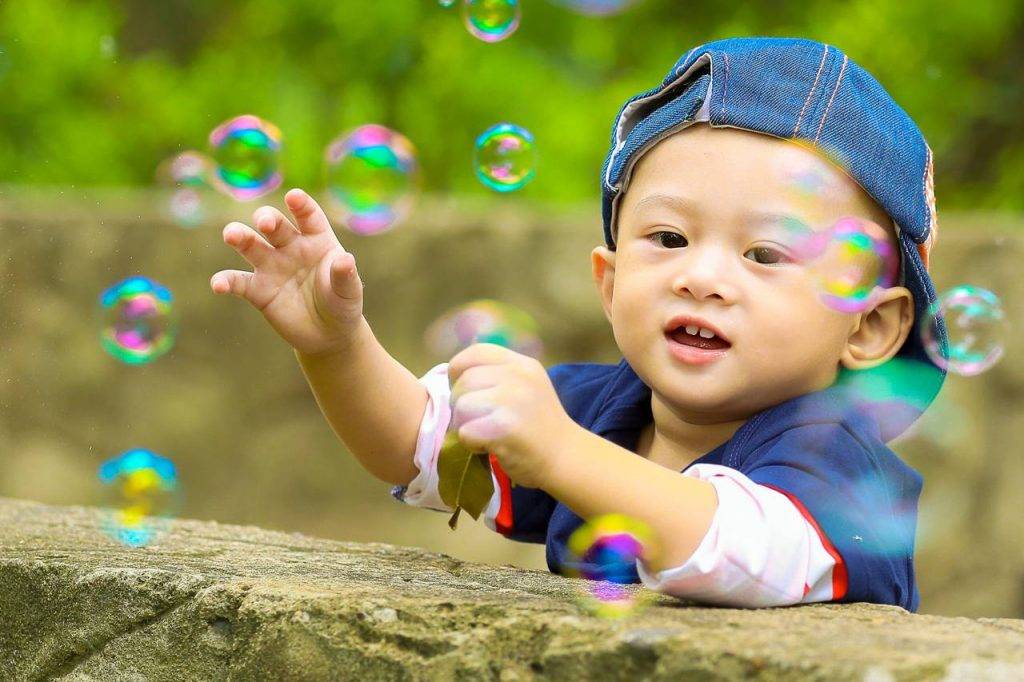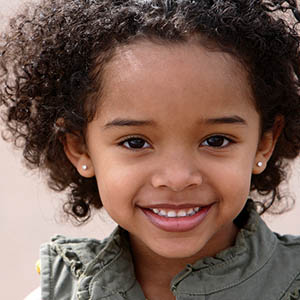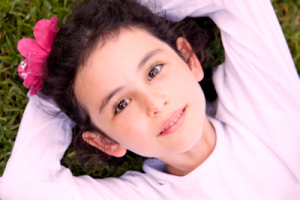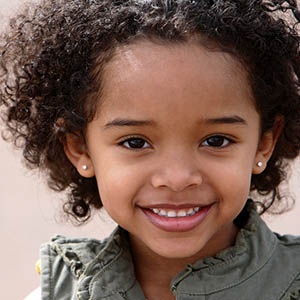Healthy vision development is a crucial part of childhood development, as it enables timely achievements of all developmental milestones.
The first three years of life will concentrate on many milestone achievements. Among the most important, is your child’s vision.
The following is a guide to some easy ways that you can stimulate your child’s vision development, and encourage healthy and strong visual skills.
Vision development during the first 4 months of life
During infancy, your baby’s eye-hand coordination and depth perception skills will begin to develop. Your baby will start to reach for toys handing on her mobile or play mat, and begin to follow moving objects with their eyes. She may also begin to examine her hands during this stage as well.
How can I help my child during this stage?
Encourage vision during quiet hours. Leave a nightlight or simply dim the lights in your baby’s nursery, to encourage your baby to look around while laying in her crib at night or during nap time.
Facilitate view of varying images and objects. Enable your baby to see different parts of her room by frequently changing her position in her crib, and even the position of the crib in the room.
Encourage reaching. Place your baby’s toys within view and reach, about eight to twelve inches away from her face, in order to encourage her to look at and reach for her toys.
Utilize mobiles and play mats. Hang a mobile above and/or outside your baby’s crib, or place your baby on her playmat for a few minutes each day. This will provide both visual stimulation and encourage reaching.
Teach your baby to follow your voice. As you walk around the room, speak to your baby and trigger her desire to look for you and she scans the room and follows your every move.
Vision development between 4 and 8 months
During these next few months, your baby will begin to turn from side to side, and use her arms and legs with more control. You may also notice increased fascination with her bottle, food, and hands. The development of her eye-body coordination skills, as well as her coordinated eye movements and focusing abilities will continue to develop at this stage.
How can I help my child during this stage?
Choose toys with different textures. Give your baby toys with varying shapes and textures to hold and look at.
Provide “free crawling space”. Encourage your baby to crawl around and explore her environment— as long as it is safe and baby-proof. This will strengthen her eye-hand coordination skills.
Play games. Your baby loves interacting with you— especially when a silly game of “patty cake” and “peek-a-boo” are on the agenda.
If you suspect your child has an eye turn, contact an eye doctor near you, who can diagnose and treat the condition.
SEE RELATED: What Is Strabismus (Crossed-Eyes)?
Vision development between 8 and 12 months
This stage of development is exciting for both babies and parents. Over the next few months, your baby will be crawling and pulling herself up, and will soon be cruising around your living room— while holding on to your couch or coffee table for support, at least in the beginning.
Visually, your baby’s eyes are more coordinated now and should work well as a team. She also has stronger depth perception skills, allowing her to judge distances with more precision, and a better grasp on her toys with improved ability to throw them with greater accuracy. You may find that your baby even begins to look for a toy that she has dropped now, as her “out of sight, out of mind” mentality has become more mature now.
How can I help my child during this stage?
Let your child crawl. While every parent waits (usually with a camera) for the moment that their child takes their first step, it is important to encourage your child to crawl until they are really ready to begin walking. In other words, don’t rush the crawling stage. Crawling is essential for their development of eye-hand-foot-body coordination skills.
Buy stacking toys. Babies love to stack blocks, Legos, cups, and anything else they can get their hands on— and then squeal in delight as they watch their towers fall down. These toys are highly recommended for stimulating eye-hand coordination skills.
Encourage play time. During playtime, give your child toys and objects she can hold and look at, at the same time— books are a great way to introduce different colors, objects, pictures, etc.
Vision development between 1 to 2 years
As your child grows, her visual skills will continue to develop. Her eye-hand coordination and depth perception skills, though stronger than a few months ago, are still developing. During this first year, your child will be able to identify objects and pictures in books, and point to familiar people in photo albums.
How can I help my child during this stage?
Encourage walking. At this stage, it is important for your child to walk around and explore her environment, both indoors and outdoors. Exploring new places and seeing new sights will stimulate her visual skills and encourage development.
Facilitate play. Your one year old loves to play. Buying her the right toys will not only encourage longer periods of play, but will also help to stimulate her visual skills.
The following toys are great for vision development:
- Balls
- Puzzles
- Shape sorters
- Building blocks
- Crayons
- Chalk
- Finger paints
- Play Doh
- Stringing beads
There are many different ways to stimulate your child’s vision. Speak with your child’s eye doctor for more ideas on how you can encourage your child’s healthy vision development.
LEARN MORE: Guide to Eye Turns
Schedule an appointment with an eye doctor for a comprehensive eye exam, and to discuss any questions you may have about treating your child’s eye turn.
Your child’s well developed visual skills will facilitate a lifetime of success academically, socially, and emotionally— and even help them to create strong bonds with those they love.









